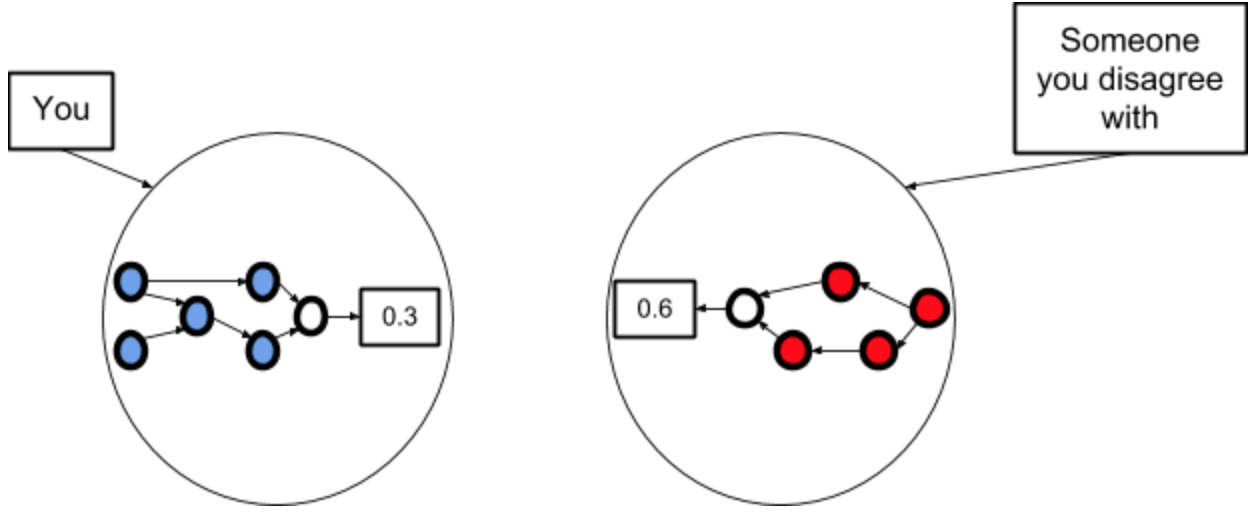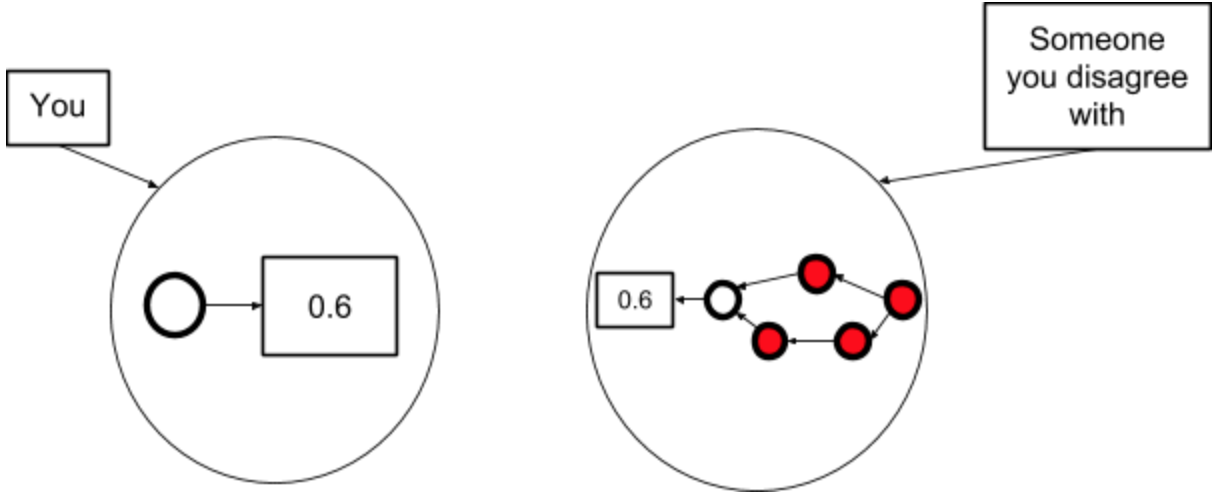It's fashionable these days to ask people about their AI timelines. And it's fashionable to have things to say in response.
But relative to the number of people who report their timelines, I suspect that only a small fraction have put in the effort to form independent impressions about them. And, when asked about their timelines, I don't often hear people also reporting how they arrived at their views.
If this is true, then I suspect everyone is updating on everyone else's views as if they were independent impressions, when in fact all our knowledge about timelines stems from the same (e.g.) ten people.
This could have several worrying effects:
- People's timelines being overconfident (i.e. too resilient), because they think they have more evidence than they actually do.
- In particular, people in this community could come to believe that we have the timelines question pretty worked out (when we don't), because they keep hearing the same views being reported.
- Weird subgroups forming where people who talk to each other most converge to similar timelines, without good reason.[1]
- People using faulty deference processes. Deference is hard and confusing, and if you don't discuss how you’re deferring then you're not forced to check if your process makes sense.
So: if (like most people) you don't have time to form your own views about AI timelines, then I suggest being clear who you're deferring to (and how), rather than just saying "median 2040" or something.[2]
And: if you’re asking someone about their timelines, also ask how they arrived at their views.
(Of course, the arguments here apply more widely too. Whilst I think AI timelines is a particularly worrying case, being unclear if/how you're deferring is a generally poor way of communicating. Discussions about p(doom) are another case where I suspect we could benefit from being clearer about deference.)
Finally: if you have 30 seconds and want to help work out who people do in fact defer to, take the timelines deference survey!
Thanks to Daniel Kokotajlo and Rose Hadshar for conversation/feedback, and to Daniel for suggesting the survey.
- ^
This sort of thing may not always be bad. There should be people doing serious work based on various different assumptions about timelines. And in practice, since people tend to work in groups, this will often mean groups doing serious work based on various different assumptions about timelines.
- ^
Here are some things you might say, which exemplify clear communication about deference:
- "I plugged my own numbers into the bio anchors framework (after 30 minutes of reflection) and my median is 2030. I haven't engaged with the report enough to know if I buy all of its assumptions, though"
- "I just defer to Ajeya's timelines because she seems to have thought the most about it"
- "I don't have independent views and I honestly don't know who to defer to"



Edit: I wrote this comment hastily when I didn't have much time today, so it may be clear or concise enough. I may return to clean it up later, especially on request, so please notify me of any parts of this comment that are hard to understand.
Thank you for writing this. I've tried having conversations during the last year to learn more about this and not only do people no report who they're deferring to but when asked, they don't answer. That's not as bad as when someone answers with "I've just heard a lot of people saying this" but that doesn't address the problem you mentioned that it might be only 10 people who they're getting their timelines from.
I don't live in the Bay Area and I'm not as personally well-connected to professionals in relevant fields, so most of these conversations I've had or seen like this are online. I understand why some might people might perceive online conversations that take longer and where nuance can get lost to be too tedious and take too much time for the value they provide. Yet why I ask is because I know I could dive deep into Metaculus forecasts or how many dozens of posts but I don't know where to start and I don't want to waste time. Never mind opting not to disclose a name or source of information, there are scarcely answers like "I'm too busy to get into this right now' or a suggestion for a website for others to check and figure it out for themselves.
To launch a survey is technically a good first step but the value of it may be lost if nobody else follows suit to engender better norms. I understand the feeling of urgency for the particular issue of AI timelines but the general problem you're getting at has in my experience been a common, persistent and major problem across all aspects of EA for years.
I remember when I was following conversations more like this a few years ago in 2018 that there was some threshold for AI capabilities over a dozen people I talked to saying it would be imminently achieved. When I asked why they thought that, they said they knew a lot of smart people they trust saying it. I talked to a couple of them and they said a bunch of smart people they know were saying it and heard it from Demis Hassabis from DeepMind. I forget what it was but Hassabis was right because it happened around a year later.
What stuck with me is how almost nobody could or would explain their reasoning. Maybe there is way more value to deference as implicit trust in individuals, groups or semi-transparent processes. Yet the reason why Eliezer Yudkowsky, Ajeya Cotra or Hassabis is because they have a process. At the least, more of the alignment community would need to understand those processes instead of having faith in a few people who probably don't want the rest of the community deferring to them that much. It appears the problem has only gotten worse.
Between those like you feeling a need to write a post like this and those like me who barely get answers when we ask questions, all the problems here seem like they could be much, much worse than you're thinking.
First of all, thank you for reporting who you've deferred to in different ways in specific terms. Second, thank you for putting in some extra effort to not only name this or that person but make your reasoning more transparent and legible.
I respect Matthew because when I read what he writes, it feels like I tend to agree with half of the points he makes and disagree with the other half. It's what makes him interesting. While some are more real and some are only perceived, there are barriers to posting on the EA Forum, like an expectation of too high ... (read more)